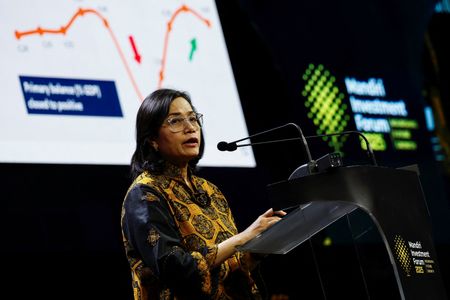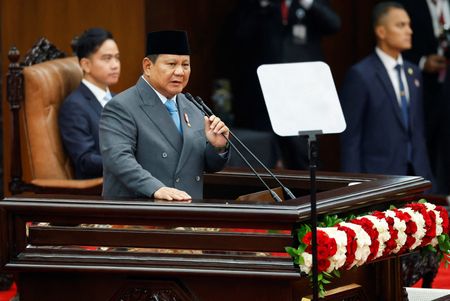By Faith Hung and Liang-sa Loh
TAIPEI (Reuters) -Taiwan’s economy is expected to grow faster in 2025 than previously forecast due to strong tech demand but will likely slow next year, the statistics agency said on Friday, amid concern about higher tariffs and uncertain U.S. trade relations.
Taiwan is a key hub in the global technology supply chain for companies such as Apple and Nvidia. Companies led by Taiwan Semiconductor Manufacturing Co Ltd (TSMC), the world’s biggest contract chip maker, have benefited from robust demand for AI applications that have powered its exports.
Taiwan’s gross domestic product is now expected to expand 4.45% this year, according to the official forecast from the Directorate General of Budget, Accounting and Statistics, higher than the 3.1% it forecast in May.
For 2025, exports from Taiwan are expected to grow by 24.04%, the agency said, upgrading sharply a previous forecast of 8.99%.
The large upgrade is “unusual,” which indicated robust demand for high-end chips and AI servers, said Cathay United Bank chief economist Lin Chi-chao.
But for 2026, the agency forecast economic growth would slow to 2.81% and exports would increase just 2.19%, given the likely impact of U.S. President Donald Trump’s 20% tariff on Taiwan goods.
Taiwan’s government has said the 20% tariff is “temporary” as it continues to negotiate with the U.S. for more favourable rates.
Given the likely slowing of export momentum next year and the impact of U.S. tariffs on more industries, Taiwan’s central bank could cut interest rates by the end of the year, Cathay United’s Lin added.
In the second quarter of 2025, the economy grew a revised 8.0%, the agency said, its highest rate in four years and up very slightly from the preliminary reading, with tech demand robust as customers got in orders ahead of anticipated U.S. tariffs.
Inflation, a key concern for Taiwan’s central bank which holds its next rate-setting meeting on Sept. 18, is going to edge lower, the agency said.
It dropped its forecast for 2025’s consumer price index (CPI) to 1.76% from 1.88% previously.
(Reporting by Faith Hung and Liang-sa Loh; Additional reporting by Roger Tung; Editing by Ben Blanchard, Kate Mayberry and Hugh Lawson)











